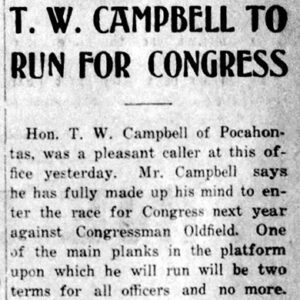calsfoundation@cals.org
Tom Walter Campbell (1874–1953)
Tom Walter Campbell was a well-known Arkansas attorney and political figure in the first half of the twentieth century. A member of the Arkansas General Assembly, he also sought election to higher office but was unsuccessful. In his later years, he authored some well-regarded historical works.
Tom W. Campbell was born on September 7, 1874, to John Stone Campbell and Alice Hufstedter Campbell on a farm near the Eleven Point River in Randolph County. After receiving his early education in the local schools, he attended Add-Ran Christian University (now Texas Christian University) in Thorp Springs, Texas.
Following his sophomore year in 1894, he returned to Randolph County, and, in 1895, he married Jenny Roberts, with whom he would have three daughters. He taught in the Randolph County schools and, in 1897, became head of the Abbott Institute in Maynard (Randolph County), where he also taught Latin, history, math, and rhetoric. Campbell also served as Randolph County examiner from 1896 to 1900, and he represented Randolph County in the state legislature in 1901 and 1903.
Throughout this time, Campbell studied the law. Obtaining a list of eighteen recommended books from a local attorney in town, Campbell read them when he was not farming, teaching, or engaged in other pursuits to support his family. In 1904, he was admitted to the bar, and he quickly established a partnership with Clarence H. Henderson. Campbell’s early practice consisted primarily of criminal work, but he then became a prominent railroad attorney. He also stayed involved with politics, serving as chief clerk of the lower house of the legislature in 1905. In 1912, he ran the first of three unsuccessful attempts to defeat Congressman William Allan Oldfield. In the final campaign, he lost by only 326 votes.
In 1914, Campbell organized the firm of Campbell, Pope and Spikes in Pocahontas (Randolph County). In 1917, when he was appointed the first assistant attorney general of the state. Campbell moved to Little Rock (Pulaski County), where he lived for the rest of his life. In 1919, Campbell became general counsel for the newly created Arkansas Corporation Commission, a successor to the state’s Railroad Commission, with a much expanded jurisdiction that called on it to regulate telegraph and telephone companies, as well as utility and power companies. At the same time, it retained the regulatory powers that had been central to the Railroad Commission’s responsibilities. The Corporation Commission proved to be a short-lived effort, replaced in 1921 with a new version of the Railroad Commission, while the regulation of utilities was turned over to the local municipalities.
In coming to the capital city, Campbell also joined the Little Rock firm of Pace, Campbell and Davis, and he maintained a relationship with the firm until 1923. In 1924, he assumed the chairmanship of the Democratic State Central Committee, a post he held until 1926. Meanwhile, in 1925, Campbell served as special associate justice on the Arkansas Supreme Court and opened a new private practice in Little Rock.
While his time as Democratic Party chairman reflected his willingness to work within the political establishment, Campbell also had a reputation as a gadfly, a perception that was reinforced by his seemingly quixotic challenge of Democratic Senate leader Joe Robinson in the party’s 1930 primary. Campbell garnered just over 51,085 votes to Robinson’s 167,167, and after Robinson ran unopposed in the general election, he became majority leader in the new Senate. Campbell returned to his legal practice.
In his later years, Campbell cut back on his legal work, and he wrote and traveled extensively in retirement. He wrote a history, The Seventy-Five Counties of Arkansas, which was originally published in the Arkansas Gazette, and he also wrote three books. His own maverick spirit was reflected in his dual biography of the Revolutionary-Federalist–era activist Matthew Lyon and President Andrew Jackson, Two Fighters and Two Fines, which was published in 1941. His own autobiography, Arkansas Lawyer, released in 1952, offered a full review of his career. His final book, Four Score Forgotten Men (1950), a collection of biographical portraits of all the justices of the U.S. Supreme Court as of the time of its publication, was as much a tribute to the law profession as it was a solid biographical reference work.
Campbell died on May 5, 1953, in Little Rock.
For additional information:
Campbell, Tom W. Arkansas Lawyer: Reminiscences of a Lifetime. Little Rock: Pioneer Publishing Company, 1952.
Dunway, Edwin E. “Review of Arkansas Lawyer.” Arkansas Historical Quarterly 11 (Autumn 1952): 230–232.
Tom Campbell Papers. Butler Center for Arkansas Studies. Central Arkansas Library System, Little Rock, Arkansas.
“Tom W. Campbell Dies At 78.” Arkansas Gazette, May 6, 1953, p. 3.
“Tom W. Campbell Died in Little Rock Tuesday.” Pocahontas Star Herald, May 7, 1953, p. 4.
William H. Pruden III
Ravenscroft School
 Early Twentieth Century, 1901 through 1940
Early Twentieth Century, 1901 through 1940 T. W. Campbell Article
T. W. Campbell Article 




Comments
No comments on this entry yet.